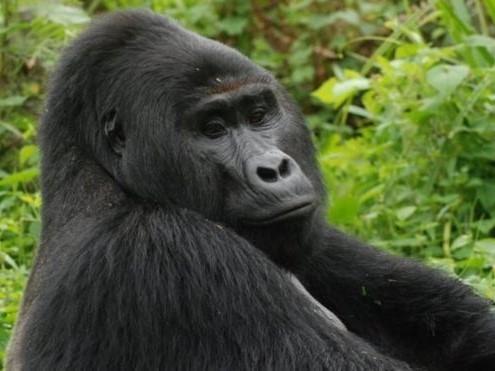How Uganda can rededicate itself to conserving wildlife in the post-Covid era
We are working with charity Space for Giants to protect wildlife at risk from poachers due to the conservation funding crisis caused by Covid-19. Help is desperately needed to support wildlife rangers, local communities and law enforcement personnel to prevent wildlife crime

Your support helps us to tell the story
From reproductive rights to climate change to Big Tech, The Independent is on the ground when the story is developing. Whether it's investigating the financials of Elon Musk's pro-Trump PAC or producing our latest documentary, 'The A Word', which shines a light on the American women fighting for reproductive rights, we know how important it is to parse out the facts from the messaging.
At such a critical moment in US history, we need reporters on the ground. Your donation allows us to keep sending journalists to speak to both sides of the story.
The Independent is trusted by Americans across the entire political spectrum. And unlike many other quality news outlets, we choose not to lock Americans out of our reporting and analysis with paywalls. We believe quality journalism should be available to everyone, paid for by those who can afford it.
Your support makes all the difference.As in other parts of the world, the impact of Covid-19 in Africa has been far-reaching and is ongoing. Apart from the regrettable loss of lives and disruption of normal life, this global pandemic has had a catastrophic impact on conservation in sub-Saharan African countries, including Uganda.
The “Pearl of Africa” has rich biodiversity distributed across both terrestrial and aquatic habitats. It has abundant and diverse species of wildlife, including the famous great apes, the mountain gorillas, and chimpanzees.
Approximately 10 per cent of Uganda is designated as wildlife conservation areas. Due to the rich biodiversity, tourism in Uganda is predominantly nature-based. The tourism sector is the leading foreign exchange earner for Uganda generating over $1.5bn annually (2019). This is about 9 per cent of GDP.
Tourism directly employs more than 670,000 Ugandans. Funds generated from the tourism sector are ploughed back into the implementation of wildlife conservation activities (90 per cent of the Uganda Wildlife Authority’s budget is from tourism activities in the parks and reserves).
When the pandemic began in Uganda, tourist visitation into the national parks and reserves dropped significantly to almost zero from a monthly average of 25,000 visitors.
Due to socio-economic pressures of a months-long national lockdown and reduced law enforcement capacity to patrol all conservation areas, we observed an increase in wildlife crime in and around protected areas by at least 20 per cent increase between March and May 2020.
This upward trend is still continuing. Handling wildlife criminal suspects during the age of coronavirus has been complex due to the need to minimise risks of spreading the virus. Suspects are released on bail which presents a risk of re-offending in poaching.
More importantly for the world, this global pandemic and its possible zoonotic origins have brought us face-to-face with how devastating the impact of illegal wildlife trade can be.
Uganda and her neighbours have experienced first hand how similar epidemics like Ebola affect communities. It is therefore important that as we begin to control and live with the virus, that we rededicate our efforts to combat wildlife crime.
Most critical towards this will be strengthening national legislation and capacities to ensure wildlife justice and an end to illegal wildlife trade.
I commend The Independent and its Stop The Illegal Wildlife Trade campaign, and welcome the support that it can bring, via its partner NGO Space for Giants, to stand with Uganda as we redouble our fight against wildlife crime.
In Uganda, we are on this path with a revamped new Uganda Wildlife Act 2019. The new act brings in changes to both offences and enhanced penalties applicable to wildlife crime in Uganda. It elevates wildlife crime from being a petty crime, as it has been viewed for decades in this country.
Accordingly, the Office of the Director of Public Prosecutions (ODPP) has established a specialised Wildlife and Environmental Crime Prosecution Division. This compliments the earlier establishment of a specialised wildlife crime court the first of its kind in Africa.
This division has a broad mandate to prosecute wildlife crime, forestry crime, fisheries crimes and environmental management crimes. It also complements the creation of a high-priority and high value specialised multi-disciplinary investigation unit at Uganda Wildlife Authority (UWA).
The prosecution division in my office will assist a small team of experienced prosecutors at the wildlife agency who for years have bravely shouldered the national responsibility of prosecuting wildlife crime.
We are working with various international agencies such as the United Nations Office on Drugs and Crime (UNODC) and conservation NGOs such as Space for Giants to build the capacity of investigators, prosecutors and magistrates to better enforce the law.
We have collaborated to create a Rapid Reference Guide for daily use – a comprehensive toolkit that fuses a full-range of the law approach and a points-to-prove method to prosecution of wildlife crime.
The road ahead will be challenging, as I expect trials with defence counsel to increase and “not guilty” pleas to be the new norm in Ugandan wildlife crime cases due to the enhanced penalties.
Therefore, the need for wildlife crime prosecution training on the new Act has never been greater than now for Uganda Police Force, National Forestry Authority and UWA investigators, ODPP and UWA prosecutors, and judicial officers, particularly the chief magistrates and judges who due to legal changes will adjudicate on most wildlife crime cases.
With the support of UNODC and Space for Giants, we will host a “National Symposium of Prosecutors” in early 2021 with the theme of “Human and Wildlife Security for Sustainable Development” to train all our prosecutors on the new law.
I hope more will join us to strategise and implement interventions that put an end to the decimation of wildlife and landscapes in Africa.
I urge governments, development partners and all global citizens, to put the protection of our natural world at the centre of building a more sustainable, resilient and prosperous global economy as we emerge from this global learning moment.
Lady Justice Jane Frances Abodo is Director of Public Prosecutions, Uganda.





Join our commenting forum
Join thought-provoking conversations, follow other Independent readers and see their replies
Comments